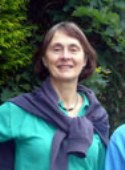Susan Kimber is currently Professor of Stem Cells and Development in the Faculty of Life Sciences University of Manchester. Her first degree and PhD were obtained at the University of Cambridge UK where she became interested in specification of early cell fate decisions in the mammalian embryo. She has worked in London, Copenhagen and for the last 18 years in Manchester.
She has 25 years experience as a developmental biologist working on early development of mammalian embryos. She is also an established international expert on mammalian implantation with a research programme in this area since 1986 leading to over 40 papers. In the last 20 years, thirty of her almost 100 papers address issues of establishment of the blastocyst and the inner cell mass (ICM) the source of embryonic stem cells as well as the first differentiation of the embryonic stem cell population to trophectoderm or later the primary embryonic precursor cells (germ layers) in both murine and human embryos. She is co-director of the North West Embryonic Stem Cell Centre (established 2006) jointly hosted by the Univeristy of Manchester (UoM), and Central Manchester NHS Trust (CMMCUHT). NWESCC spans two sites, at St Mary’s Hospital [CMMCUHT] and in the Core Technology Faciltity (UoM), and encompasses both clinical and academic expertise. The remit of the Centre (funded by NWDA and MRC) is to establish human embryonic stem (hES) cell lines under clean room conditions suitable for therapeutic use. We have published a number of papers addressing maintenance of pluripotency and are actively engaged in researching the mechanism by which hES cell pluripotency is maintained, including research projects on the hES cell niche. Our research programmes also include understanding, and targeting, differentiation of these cells to endodermal ieages and to mesodermal lineages most successfully to chondrogenic cells which form cartilage.
Susan Kimber is a member of the Stem Cell Liaison committee, the programme committee for the UK National Stem Cell Network and the grant committees of the research charity RCOG/Wellbeing and the Federal Ministry of Education and Research (Germany) for stem cell research.




